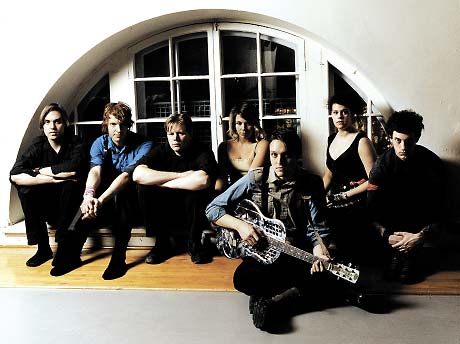Brushing aside hype and then exceeding expectations, Montreals Arcade Fire have composed a wondrous album in Neon Bible, 11 stunningly crafted rocknroll songs that wisely capture a generation grappling with hope, fear and frustration in our modern times. If Neon Bible has a landscape then its a post-apocalyptic shell where pettiness and paranoia have finally shaken the resolve of the faithful. This frightening vision generates so much emotion in vocalist Win Butler and his band-mates that their music shakes and shivers defiantly as they scrutinise the implications of western cultural values. Falling bombs and groaning soldiers are linked to the occult and the church, respectively, on impassioned songs like "Black Mirror and "Intervention, which decry the very notion of "holy wars from deeply personal perspectives. "(Antichrist Television Blues) subverts a Springsteen-esque romp, connecting fears of planes crashing downtown to prayers for get-rich-celebrity-exploitation, while the harrowing "Windowsill alludes to environmental collapse wrought by complacency and distractions (i.e., MTV, the threat of WWIII.). Fuelled by vivid arrangements that swell and sink perfectly, Neon Bible is a record by young, romantic observers of a still salvageable world gone awry. Artistically and politically its an important, heavy statement by the Arcade Fire.
Did anticipation for Neon Bible affect you?
Jeremy Gara [drums]: We worked in a studio about an hour outside of Montreal and kind of closed the door on everything. As soon as there was a deadline or calendar up then wed stress out but Win literally tore the calendar down early on. We knew that no matter what we came up with itd be "the sophomore album but you cant really fight that.
This record seems bleak
Weve gone all over the world together and seen all this crazy shit, so we cant help but be more observant of the world at large. These songs are obviously open to interpretation but yeah, on most days I look at this album as a pretty dark observation.
What about the sound of it?
I think we wanted to put the Funeral songs behind us but it was more intuitive. It was more a question of filling the studio with instruments, whether we had them or not. We bought a bunch of weird shit a hurdy-gurdy, some timpani drums and they just ended up on the songs. There was no master plan; it was just like, "Oh, I feel like playing mandolin on this song.
(Merge Records)Did anticipation for Neon Bible affect you?
Jeremy Gara [drums]: We worked in a studio about an hour outside of Montreal and kind of closed the door on everything. As soon as there was a deadline or calendar up then wed stress out but Win literally tore the calendar down early on. We knew that no matter what we came up with itd be "the sophomore album but you cant really fight that.
This record seems bleak
Weve gone all over the world together and seen all this crazy shit, so we cant help but be more observant of the world at large. These songs are obviously open to interpretation but yeah, on most days I look at this album as a pretty dark observation.
What about the sound of it?
I think we wanted to put the Funeral songs behind us but it was more intuitive. It was more a question of filling the studio with instruments, whether we had them or not. We bought a bunch of weird shit a hurdy-gurdy, some timpani drums and they just ended up on the songs. There was no master plan; it was just like, "Oh, I feel like playing mandolin on this song.
